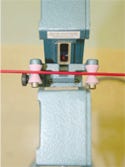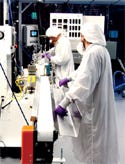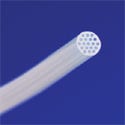November 8, 2007
Originally Published MPMN November 2007
OUTSOURCING OUTLOOK
Extrusion
|
Bill Depel, president, HTG-Accusil, Merrillville, IN. |
A critical element of outsourcing medical-grade tubing is a transparent partnership between the OEM and the contract manufacturer (CM) from the inception of a project to its completion. In the case of medical-grade extrusion, the OEM should first visit the potential contract manufacturer to determine answers to the following questions:
How receptive are the CM’s management personnel to the OEM visiting the manufacturing facilities?
Is the CM’s manufacturing facility ISO 13485 certified and FDA registered?
How does the CM’s internal quality control procedure handle incoming silicone and other raw materials?
How is the silicone raw material compounded, formulated, and stored prior to being extruded?
Does the CM have certified Class 10,000 or 100,000 cleanrooms for extrusion and inspection?
How are the in-line tubing dimensions monitored and process validated?
Are secondary operations performed within the certified cleanrooms?
Can the CM build its own extrusion pins and dies for rapid prototyping and production runs?
The finished properties of medical tubing are highly dependent on the specific material used to extrude the tubing. An OEM cannot, therefore, overemphasize the need for open dialogue between the OEM and the CM about selecting the appropriate base material in terms of both functional performance and chemical or drug exposure. The same holds true for tolerance specifications of the tubing where the ID, OD, wall, and length tolerances must be based on the performance requirements.
An open and dynamic partnership between the OEM and the CM invariably results in a long-term and mutually beneficial outsourcing partnership.
Supplier Offers Thermoplastic Extrusion
|
A provider of custom medical-grade tubing offers bump tubing, striping, coextrusion, and overextrusion services. Extruded thermoplastic single- and multilumen tubing can be manufactured up to 0.4 in. OD. Custom compounds as well as polyurethane, nylon, polypropylene, low-density polyethylene, and natural or filled polyesters are available. The company’s manufacturing facility is compliant with the ISO 9002 standard.
Dunn Industries, Manchester, NH
www.dunnindustries.com
Extrusions Performed Specifically for Medical Applications
|
A company offers custom extrusion development and manufacturing of high-precision medical-grade silicone tubing. Coextruded, profile, and wire-reinforced tubes are produced on systems that feature computer control and measurement capability. Extrusion of radiopaque markers and multilumens, as well as simultaneous two-material extrusions, are offered. Reinforced tubing in a variety of sizes is also available. Services are provided in an FDA-registered facility that features Class 10,000 cleanrooms.
HTG-Accusil Inc., Merrillville, IN
www.hi-tech-group.com
Service Provider Equipped with Nine Extrusion Machines
|
Nine extrusion machines enable a service provider to meet tight deadlines for a variety of capabilities, according to the company. Offerings range from single-lumen medical tubing to coextrusions and multilumen tubing with a maximum of 28 lumens possible. Formulations range from clear to pigmented to radiopaque. Wire or thread can also be included as substrate reinforcement to provide added strength, kink or stretch resistance, and electrical conductivity. Applications include specialty two- and three-way catheter mainshafts, drainage tubes, vascular loops, and balloon cuffs. The company is ISO 13485:2003 compliant.
Vesta Inc., Franklin, WI
www.vestainc.com
Extruded Tubing Achieves Tight Tolerances
|
Tubing extrusion is performed by a company in a controlled environment. Predried pellets are fed into an instrumented single-screw extruder with closed-loop control on diameter, wall thickness, and other geometric parameters. The in-house equipment enables continuous production of tubing with wall tolerances as tight as ±0.0005 in. and tightly controlled concentricity. The tubing can contain fillers or pigments specified by the customer. Materials formulation and processing, as well as material design for custom applications, are available.
Polymer Technology Group, Berkeley, CA
www.polymertech.com
Company Offers Application-Specific Tubing
|
A company can create application-specific extruded tubing. Consultation on resin selection is offered and material testing is provided. PTFE, FEP, PFA, PEEK, and PEEKshrink resins are supplied in-house. Ten production sites in North America and Europe enable high-volume tubing production, and duplication of most extrusion production lines allows for manufacturing of identical components in multiple locations. Postextrusion modifications are available.
Zeus Industrial Products Inc., Orangeburg, SC
www.zeusinc.com
Copyright ©2007 Medical Product Manufacturing News
You May Also Like








